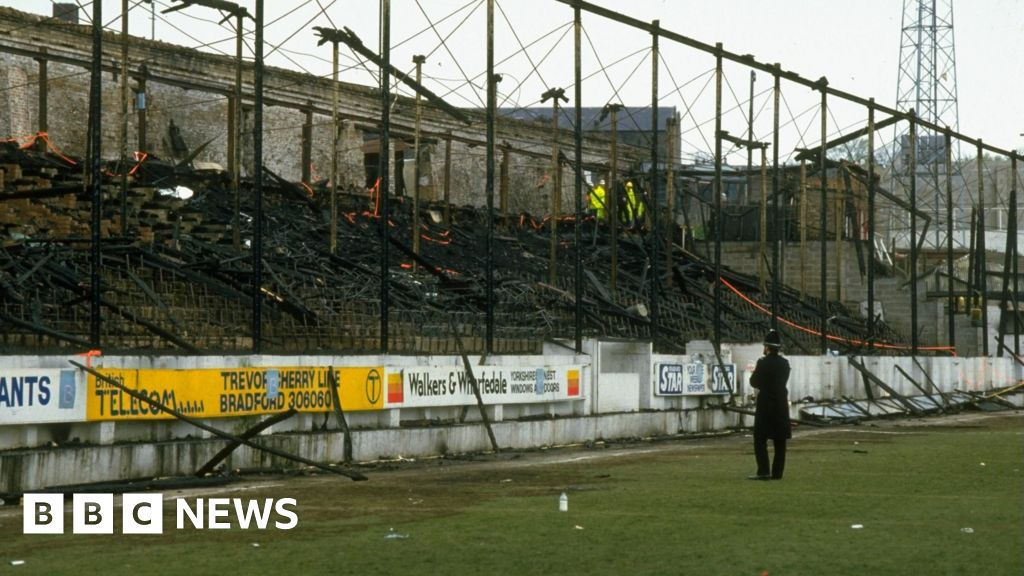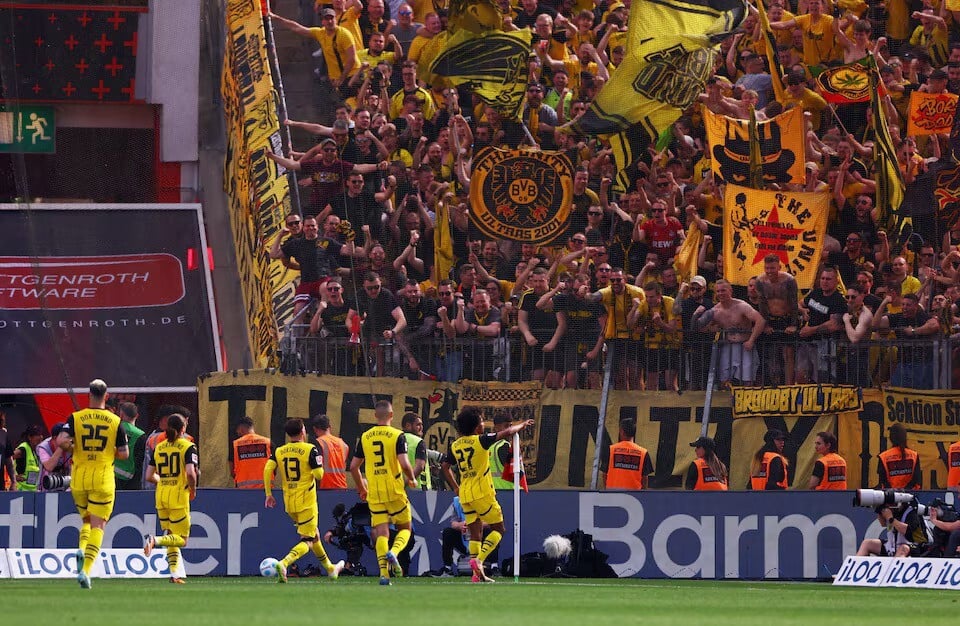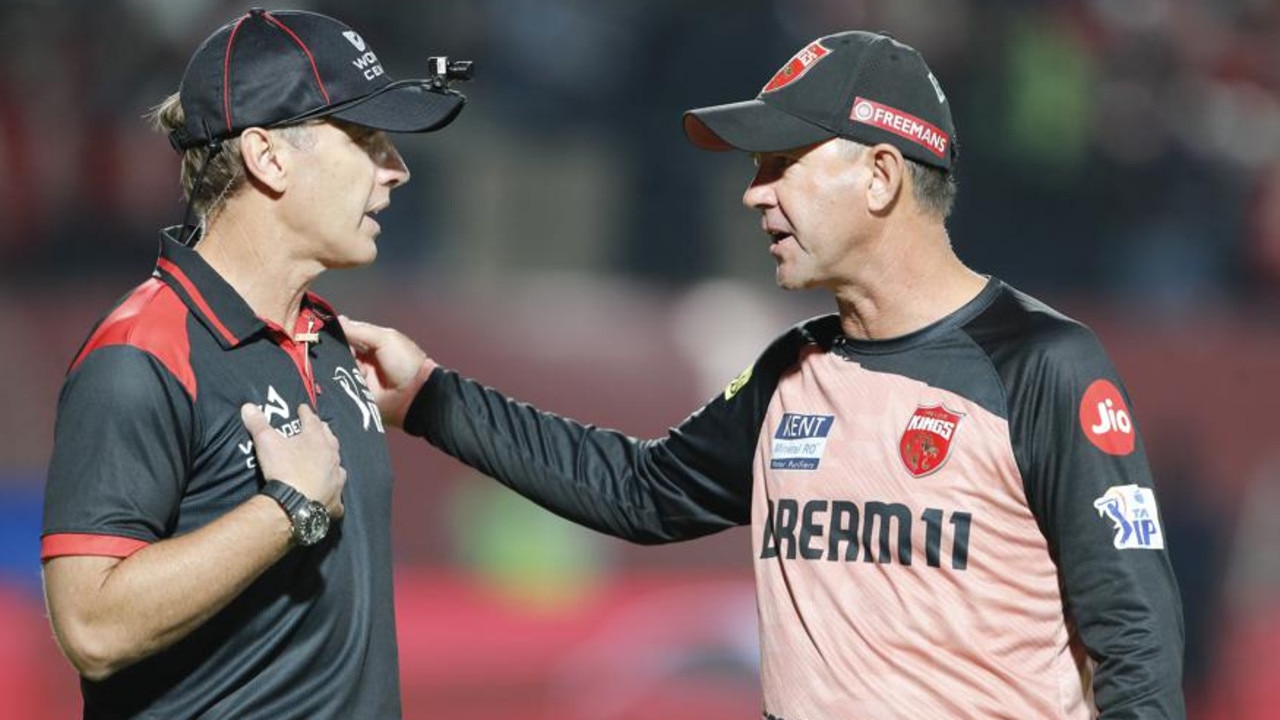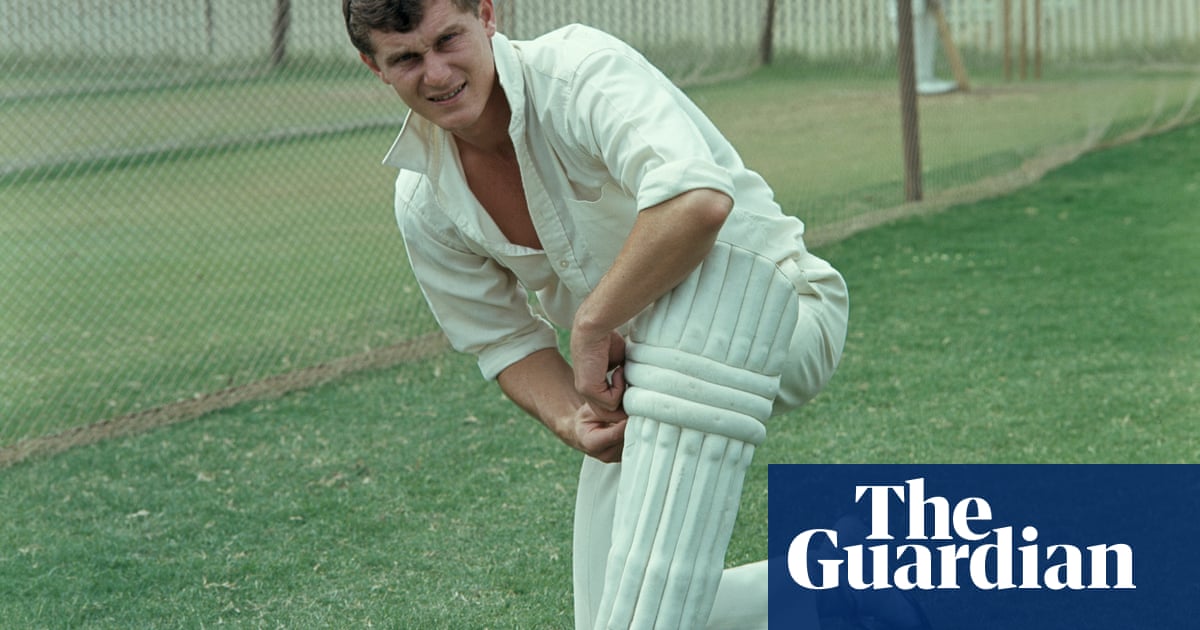Bradford City fire remembered on 40th anniversary of Valley Parade disaster

270 seconds, 56 lives and 40 years: The story of the Bradford City fire37 minutes ago Share Save David Spereall BBC News, Yorkshire Share SaveGetty Images Fifty-four Bradford supporters and two Lincoln fans died in the disasterForty years ago this weekend, what should have been a day of celebration for Bradford City turned into one of tragedy as a fire swept through the club's home ground and claimed the lives of 56 fans. This is the story of the disaster on 11 May 1985, as told by four of those who experienced it."It was such a beautiful day," recalls Bradford-born commentator John Helm, who was working for Yorkshire Television that day. "The sun was shining and everybody in the city was happy." A home game at Valley Parade against Lincoln City was due to mark the end of a memorable season which had seen the hosts top the Third Division, their first title since winning the same league in 1929. "Bradford City had already won promotion and were due to receive the trophy in front of their adoring fans," Helm adds. "Lincoln had nothing to play for, so you couldn't possibly imagine anything wrong." For centre-half and club captain Peter Jackson, leading his hometown club to the title was a source of triumph. "Particularly for me being a local lad and having lived and gone to school locally, it was a proud day," says Jackson, now 64. "It was supposed to be a special day, but it turned into a disastrous day."Getty Images The fire took minutes to destroy the stand completelyThe game started uneventfully enough, but around the 40-minute mark, Helm spotted something unusual in the stand opposite his vantage point. "My commentary position was almost like in a garden hut on the Midland Road side of the ground looking across to the main stand," he says. "I think it was Stuart McCall who had the ball in his hands ready to take a throw-in and I just noticed over his shoulder, about seven or eight rows back, a tiny glow of a fire. "The most chilling fact for me was that four-and-a-half minutes later the entire stand was gone. Four-and-a-half minutes. That's how savage that fire was." Stood in the Kop, to the side of the affected stand, was 24-year-old fan Linda Norton, with her husband Bob. "I saw some smoke and my first thought was that it was a smoke bomb," recalls Linda, who was four months pregnant with her son Lee at the time. "Then you saw flames and people running out of the back of the stand and others going to the front to climb over the wall and get onto the pitch. "We went down onto the pitch ourselves and the flames were getting bigger and bigger. It was scary."Linda Norton Linda Norton attended the match with her husband BobMeanwhile, Helm was told live pictures of the scene were being picked up by national television as he relayed what was happening. "(The message) was not to overdramatise," he says. "And why would you when you could see the horror that was unfolding before my very eyes? "All the emergency services still use the footage from that day for training. "At one point, which was awful in my mind, one or two people were throwing stones at me and shouting, 'Switch your so-and-so camera off'. "Well it's a good job we didn't because of the very fact those pictures are of colossal value today."Getty Images Bradford-born commentator John Helm has never been able to watch footage of the tragedyTwo hundred miles south and oblivious to the chaos was Valley Parade regular Steve Ding, then 22. He had gone to the Royal Albert Hall with the Boys' Brigade, but his 59-year-old father Alan and his cousin's husband, Ken, were at the match. "It was only when we got back to our hotel at about 17:00 BST that we turned on the telly and saw it on Grandstand," Steve says. "I still remember the words, 'We're going back to Valley Parade now where there's been horrific scenes,' and my first thought, because hooliganism was so common at the time, was, 'They've not been fighting today on a day of celebration have they?'" After seeing footage of the blaze, Steve and Ken's son, who was with him on the London trip, raced downstairs to call home from the hotel reception. Thankfully, both Alan and Ken had escaped unharmed.Getty Images An inquiry later found a dropped cigarette had ignited rubbish lying underneath the stand"It was just a massive sigh of relief," Steve says. "My mum picked up the phone and my dad had literally just got through the front door. He was fine, but he was coughing a lot because of the smoke." Back on the pitch, Linda recalls her and Bob feeling a sense of helplessness as the fire spread. "We wanted to help but the flames were getting more intense and you could feel the heat as well. You just didn't know what to do. "We thought everybody had got out. I saw one middle-aged man lying on the pitch who was being seen to, who we thought might have had a heart attack and might be the one person hurt. "But we got home and put the telly on and they said people had died. And then the numbers of those who'd died were just going up every few minutes. We couldn't believe it." Club captain Jackson had managed to get his wife and daughter out of the stadium unscathed, but in a pre-mobile phone era he had suffered an agonising six-hour wait before discovering his father and two brothers had also escaped without injury. "I drove past Bradford Royal Infirmary on my way home and I just saw hundreds and hundreds of people sat on the wall outside in Bradford City shirts," he says. "I stopped and went into the casualty department. "There were people with 20% burns waiting to be seen and all they wanted to talk to me about was playing Leeds United and all these big clubs in the second division next season. It was humbling." After getting home that night, Jackson remembers doing TV interviews in his garden before "sitting down on the settee, still in my kit". "I didn't go to bed - I was just staring at the TV," he adds. "I just didn't know what to do."Getty Images Peter Jackson, who captained Bradford on the day, would later manage the club as well as Lincoln CityThe final death toll was later revealed to be 56. Fifty-four were Bradford supporters, while the other two were Lincoln fans Bill Stacey and Jim West. A stand at Lincoln's Sincil Bank ground is named after them as a lasting tribute. Helm recalls interviewing supporters later, including one man who was able to escape by clambering over the wall and onto the pitch, but who could only watch as his elderly father was fatally trapped, unable to make the climb himself. "Those are the sort of chilling stories... it's sending a shiver up my spine now to be honest just talking about it," the commentator says, adding that he has never been able to look back at the footage of the day. "It's still extremely raw, even 40 years on." A common strand between Helm and Jackson's stories is a workplace approach to trauma and grief that was very much of its time. Helm asked for the following day - a Sunday - off work but was told he had to go to the Odsal Stadium, also in Bradford, to present speedway coverage as scheduled. "I did it, but on the understanding that I'd then have a week off because I was traumatised without question," he explains. "I probably should have had a little bit of counselling, which I never did have." Jackson, meanwhile, says he and his fellow players "never got any help or support" as he began organising squad trips to attend funerals, charity events and to visit the injured in hospital. "It was a big responsibility for a young lad my age to take on," he says. "I just remember thinking, 'We're not trained for this - we're professional footballers'."Getty Images The victims are remembered on the Valley Parade Fire MemorialReturning from London by train on the Sunday, Steve would discover his dad had been missed by a fireball by "a second" as he fled with Ken, having been stood in a corner of the ground with the stand to his left. "He was pretty laid back my dad," Steve says. "He was an engineer by trade. If he was traumatised or if he felt angst or anxiety at all, he wouldn't have talked about it." Picked up from Bradford Interchange on Sunday evening, Alan drove Steve past Valley Parade on the way home. "It was horrendous," he says. "You could see how hot it would have been. The metal frames that were left were disjointed and out of shape. "I'd been really torn between going to London and going to the match, but I just felt I couldn't let the kids (in the Boys' Brigade) down in the end. "It sometimes comes into my mind, the question of what would have happened if I'd gone. What would the circumstances have been?"Getty Images Smoking was banned in wooden stands following the catastropheAn inquiry later found the fire was started accidentally, caused by a lit cigarette falling on rubbish gathered underneath the stand. Decades later, amid scrutiny of that inquiry, theories that the blaze might have been started deliberately were voiced. However, both Helm and Jackson are unequivocal that there was no foul play. "It was an accident," the former captain says, firmly. "Underneath the stand it was a tinderbox waiting to happen. There were holes in the stand and people just used to shove rubbish through it. "After that game the whole stand was going to be knocked down so the ground could accommodate Second Division crowds. That's the sad thing, the diggers were there ready to take it down." Helm adds: "The rubbish underneath the stand was the reason. "It was something that shouldn't have happened. It will hopefully never happen again anywhere in the world." The building of new wooden stands at football stadia in the UK was halted after the disaster, while smoking in the ones that remained was banned.Getty Images Victims have been remembered throughout Bradford's history, including at the club's League Cup final in 2013Linda says she seldom spoke about the fire until joining the BBC's Bantam of the Opera choir earlier this year. She has exchanged anecdotes about the day with other members, which include Steve. "Talking about it has helped," she says. "It's so absolutely 100% important we remember those 56 people, not just on the anniversary, but every day." Jackson feels that while the tragedy is always respected at Bradford and Lincoln, where he also later managed, it has become a "forgotten disaster" beyond the two cities. "It was a day that can never be forgotten," Jackson says. "It's important the story is passed down to future generations."Listen to highlights from West Yorkshire on BBC Sounds, catch up with the latest episode of Look North.














